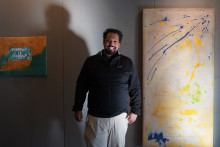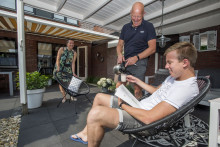The executive boards call the plan unique for the Netherlands. `For the first time, three universities have combined forces. That makes them the largest educational institute of the country.' The universities of Twente, Eindhoven and Delft are planning to form a federation in 2007. An important element of the plans is the five centers of excellence. To fund those, the three TUs are calling on the fifty million euro reserved for their plans by the Ministry of Education. However, the condition for those funds is that the plans be submitted by mid- December. The five areas selected by the executive boards are: high tech systems and materials, technologies for sustainable energy, fluid and solid mechanics, applications of nanotechnology, and a segment of the future ICT top institute Nirict, namely `services and applications.'
The three TUs are also working on six new technological institutes of separation technology, biocompatible systems, embedded systems, plasma technology, regenerative medicine and ICT and medical care. The Ministry of Economic Affairs has promised to fund these institutes. The difference between the centers of excellence and the TTIs is that the centers are more fundamental and determine their own course, albeit with involvement from businesses. The technological institutes deal more applied research, with regular participation of businesses and other universities.
The executive boards speak of `irreversible measures' that will take effect in 2006. In preparation, all library facilities will be directed centrally and work is being done on a map of all the research at the three TUs, including the topics and size of all research groups. As a part of that process, the 3TU research will be connected to that of businesses as well as TNO, KNAW, NWO and other institutes. The universities are also working on a quality monitor that will measure the quality and social impact of every research group every two years.
In their research plan, which includes extensive argumentation supporting their choice of these areas, the three executive boards write that this choice of `focus and mass' will make the TUs a strong force in the European playing field. `We will be able to compete thanks to our concentration of top research. The research is of social importance it is the basis of master's and PhD programs that will attract a lot of top talent, and it will ensure `valorization,' capitalizing on research both commercially and socially.' Each TU will appoint people who will shape the new initiatives based on business plans.
Trans. Jeroen Latour







